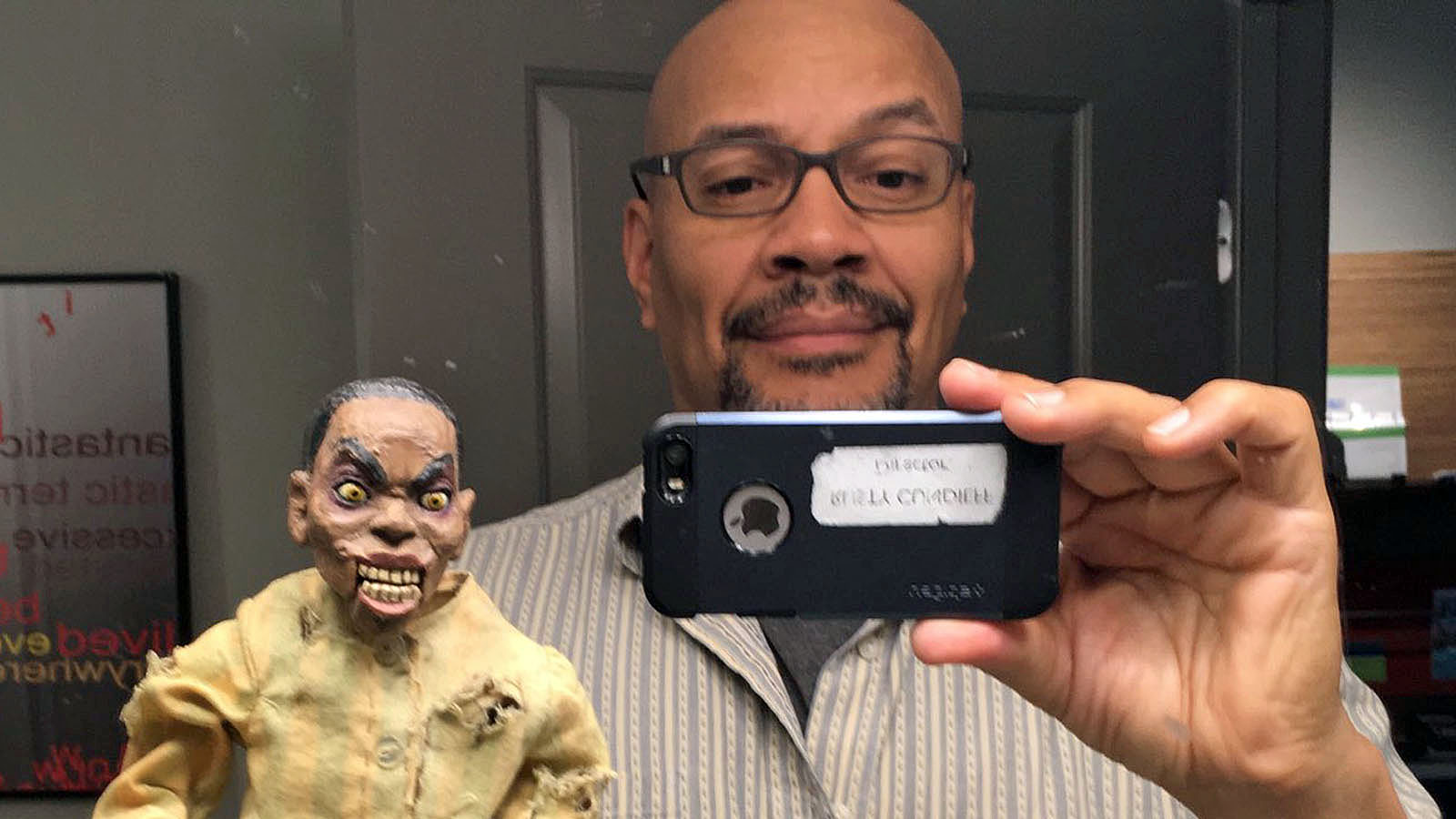
I’ve reached a place of acceptance where I can admit without shame that I watch scary movies between my fingers and am squeamish when it comes to gore. But the exquisite nature, art, and imagination of horror films haven’t been lost on me. I can even say that I love them. Black actors and directors have been an increasing creative force in the genre, and over time they’ve made it their own. Rusty Cundieff is such a filmmaker—he’s a legend and there is no denying that. Not only has his enduring career been marked by wildly funny storytelling, but he’s also a true pioneer in crafting stories that utilize racism to reflect on the Black experience in America. His clever screenwriting—including the likes of Fear of a Black Hat (1993), Sprung (1997), and especially Tales from the Hood (1995) and its two sequels—has become gospel. It was a career high for me to share a conversation with him and look back on his impact as an acclaimed Hollywood-backed artist, beloved worldwide and especially venerated by the Black and horror communities.
Can you please share what inspired you to pursue filmmaking? You moved from Pittsburgh to L.A. and transferred to USC: did you have any inkling from an early age that being a filmmaker was a possibility?
When I was a kid in Pittsburgh in the ’60s, TV and film were really big. I was a horror fan, probably not the hugest, but we had Chiller Theatre that would come on Saturday nights in Pittsburgh, hosted by Chilly Billy Cardille, who sat in a castle and would play monster movies. And [later on] out in Los Angeles they had Elvira. Most big cities had some local horrormeister that would show scary movies on the weekends, so that was kind of my introduction to horror. And I always enjoyed comedy from being in plays as a kid and getting a few laughs onstage—so that’s the horror and comedy side of my youth. My dad was very involved in a lot of social and political things, so that pretty well sums up all the films that I’ve either written or made—they’re either comedies or horror, or horror-comedies, and, generally speaking, they all have some sort of social or political message to them.
My first year of college was at Loyola in New Orleans and then I transferred to USC—I wanted to go into their television and film department, but it was actually pretty crappy when I first got there. The Steven Spielbergs and the George Lucases of the world had not yet made their marks and donated hundreds of millions to USC, along with Dr. Dre and [Jimmy] Iovine. But I’d always felt as a kid I wanted to come to Los Angeles because I kind of knew I wanted to be involved in the entertainment business. I had started doing stand-up comedy by my second to last year of high school, so I was performing in clubs around Pittsburgh, and then when I went to school in New Orleans I was doing stand-up in the summers, and was still doing it while I was at USC, so my first real connection to the business was as a performer, as an actor, a stand-up kind of guy. I hadn’t thought a lot about directing at that point, but I definitely appreciated the art of directing and took some courses at USC that looked at filmmaking though I wasn’t a film major—philosophy of religion, journalism, and drama were the three degrees I graduated with.
Philosophy of religion—that’s quite a departure from film.
Ah, yes and no.
Were you thinking of…
Joining the priesthood—NO! [Both laugh] Not at all.
It’s interesting, because I wanted to talk about the use of voodoo in Tales from the Hood. I love that we now know where the seed of religion was planted as a resource for the spiritual elements in your work.
Well, you know there’s nothing scarier than stuff you read in the Bible… And actually, some philosophy of religion [coursework] was really interesting because you learn a lot about who people are based on what they professed to believe in, and how they create their theologies. They ask the same questions that philosophy does; they just start with, “Welp, this our god,” whichever god that may be, and they try and figure it out based on whatever scriptures, writings, stories, hand-me-down tales that they have in their religion.
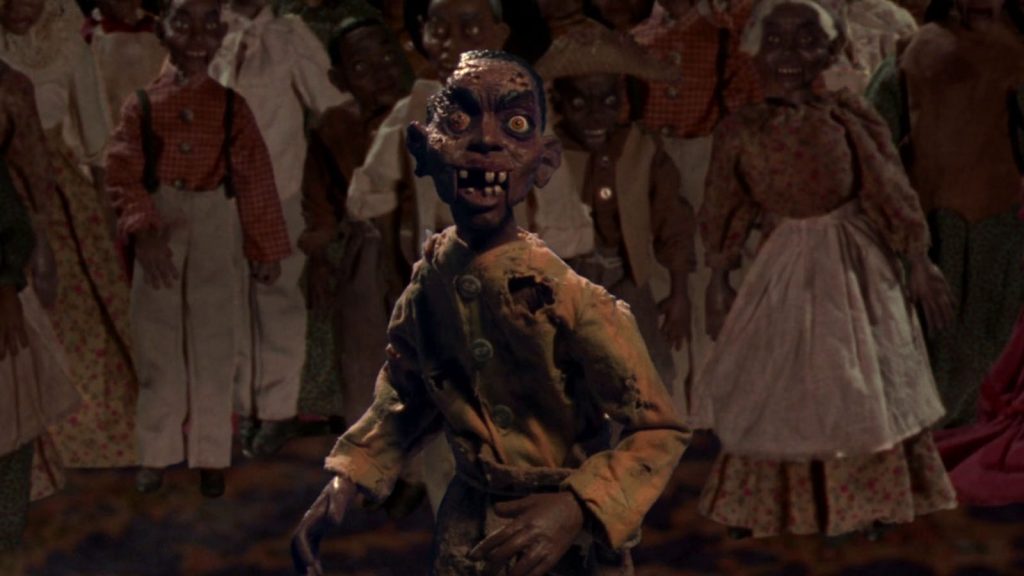
It’s important to have a wide-reaching grasp on humanity to effectively explore it. Satire is consistently used in your films. Can you reflect on your approach to humor in horror and the key elements that define the absurdist racial humor you draw from?
Comedy for me, initially, and probably for a lot of people who go into it, was a kind of a protective thing. If you’re the odd person out, are in a minority, are somehow a lightning rod for unwanted attention, one of the ways to diffuse it is through humor. I think because I lived in white neighborhoods for a decent part of my development and would end up in these situations where you weren’t necessarily welcome, or not welcomed with open arms—I won’t say that we ever had a cross burned on one of our lawns, but I remember looking for houses with my parents, and people would see us come up the driveway and be like, “Oh, this house is no longer for sale.” Or [I remember] moving into a neighborhood and the neighbors next door immediately moving out, or not wanting you to play with their son, that sort of thing. That happened in Pittsburgh, and, like I said, I was a child of the ’60s, so there was still a lot of racial animus—not that there isn’t today, there’s a lot of it still going on, but then violence was a little bit more at the ready, with the [Vietnam] war and everything. So I think I probably started using humor as a defensive shield in my years at white Catholic grade schools, and then eventually at a prep school where there were maybe only two other Black kids there. It was a lot of that, and just my love of stand-up: George Carlin, Richard Pryor, all those things that I would try to emulate. But tying it into horror… as you were saying, this absurdist comedy, as portrayed in Black horror, at least in my Black horror…
I don’t want to define your work—I never want to do that to an artist, of course—but I’d situate Tales from the Hood within grindhouse.
Yeah, it’s a little bit of that, for sure.
And in watching films from a certain era, you know so much of them were carefully crafted by human hands, especially the effects. Seeing how technology has very quickly developed in that space, one appreciates the ingenuity, but you also think, “Wow, that was—”
“—that was then.” Well, okay, two things. One: just because I want to go back to the comedy thing in horror, which is really just taking some kernel of truth and pushing it to its most outrageous limit within the framework of the piece that you’re doing. In Tales from the Hood, the episode with the dolls is probably a pretty decent example, because you have Corbin Bernsen who’s playing this politician running for office, and he doesn’t have any problem with kind of courting race to get the job done, but these dolls and the things that happen when the dolls approach him, and his reaction to them, is just over-the-top racist ridiculousness. “I’m gonna blow off your little nigger balls” and that crazy stuff that he says to the dolls, people laugh at it because it’s presented in this skewed manic, ridiculous, and somewhat audience-protected way. You’re waiting to see what happens to this guy, so that allows you to step back and laugh at something that ultimately would be offensive, or make you want to fight.
On the flip side is the episode with David Alan Grier. He’s a child- and wife-abuser, and there’s a scene where he’s beating Paula Jai Parker, who plays his wife, with a belt. She’s down on the floor and he’s just whipping the hell out of her—what you’ve seen is a shortened version of that beating; there’s a longer version that I wish was still in the movie, to be quite honest—and the first time we screened it for an audience, with the long version, there were a lot of younger kids in the audience. When he first starts beating her, people start kind of laughing, and over time, it goes from this kind of laughter, which I was saying was protective laughter because you have all these kids—many who have seen some sort of violence at home, and then others who are teenagers and don’t want to look like punks—who are not gonna cry, so they’re gonna laugh. But after a few minutes, it got very quiet and I saw some people tearing up.
Most people don’t want to go to the movies to feel crappy, even if it’s a good film, even it’s telling a truth—so when you add humor, it allows you to slide in your messages without people feeling like they’re being preached to, or feeling uncomfortable, the entire time. You can still make them uncomfortable, you can give them moments of emotion when you flip the script the way I was talking about with the beating, but at the same time you get ’em into the theater, you get them to watch. I don’t mind feeling bad. [Laughs] I don’t mind getting angry; maybe that’s because I grew up with a dad that dragged me to every protest march in the city of Pittsburgh.
And as far as technology, I love the old… I got to do a couple episodes of Creepshow with [showrunner] Greg Nicotero a year and a half ago, and it was so much fun because it was the first time I had dealt with practical effects like that probably since Tales. Because so much stuff now is digital, you know there’s a way to do this and that where you don’t have to have some guy standing there with a sprayer with 10 gallons of blood, but there’s something about the practical nature of effects that’s scarier to me. I mean, the ways the dolls move in Tales from the Hood, that stop-motion is far scarier than anything that I think could have been created with CGI. Even today, there’s something about seeing an inanimate thing being animated that is spooky, and the moment you turn it into something digital, no matter how lifelike you make it, it’s still a cartoon. It just doesn’t have the same impact.
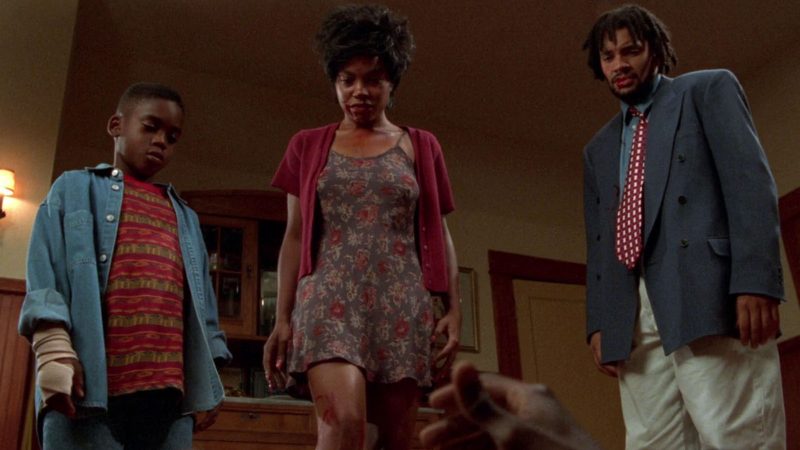
I love your appreciation for physical special effects over digital. Do you feel like it gives you more of an opportunity to be inventive?
Well, I would definitely say that if you’re doing something practically, it forces you to think out your process. You have to have a game plan—not to say that you don’t have a game plan when you shoot digital, but there are so many times where you’ll be on set and it’s like, “Don’t worry, we’ll fix that in post.” When you’re doing practical effects, you can’t say that. You have to know how much of the monster’s arm you need coming through the door, and you need to know it on the day that you’re shooting, because if your effects team hasn’t built an arm and all of a sudden you see some dude with sunglasses with a monster arm in the shot, then you failed. So there’s more planning that has to go into practical work. I would even compare it to using a manual typewriter, which is how I first started writing.
Speaking of screenwriting, can you talk about Black people’s relationship to the concept of “laughing through your pain”? What’s so special there for you in those “pockets of Black joy” that find their way into your work?
I don’t know, I think it’s just kind of a moment of acknowledgment. When you laugh at something, you make a connection in a certain way. So I think in terms of what you’re saying about the shared-experience humor, all groups have it: there are gonna be certain things that Italians or Jewish people might say that means something to them that other people may or may not get. It doesn’t mean that other people couldn’t enjoy a film or a show about them, but there are nuances that make it more meaningful or have an elevated level of experience to the audience that actually knows the landscape. I mean, with my first film, Fear of a Black Hat, which is a rap mockumentary, there were people who got that I was kind of goofing on hip-hop, but then there were the people who would come up to me and say, “Fear of a Black Hat was awesome because you obviously hate rap as much as I do.” And I was like, “No, I don’t hate rap at all.”
When we talk about the types of humor, absurdist or whatever, satire is the trickiest of all. I mean, I’m not necessarily saying it’s tricky to do, but it’s tricky in terms of how an audience perceives it. Fear of a Black Hat has a lot of satire in it. People who knew where I was coming from got it; people who didn’t [know] viewed the satire as something else. When I was doing Chappelle’s Show, that was one of the things Dave was kind of wrestling with. He was like, “Who’s laughing and why are they laughing?”
I’m glad you brought up Chappelle’s Show. At least for me, if you didn’t watch that show, you weren’t shit in school. It was hugely popular, not just as sketch comedy but as parody. And in terms of writing and directing some incredible episodes there, did it feel like a fresh take on comedy to you?
Yeah, it did, because, like I said, when I first started doing stand-up, I listened to a lot of Pryor, Cosby, Carlin, all those guys. There was plenty of racial humor, but there was a point where I was like, “It’s just all been done.” How many more comedians do I need to hear set up a joke with: “white people do this but Black people do this, or Black people do this but white people do this”? And Dave didn’t really do that. He dealt with race, but he just didn’t go down the same path. He’s arguably, or perhaps not arguably for many, a comic genius. The fun thing about that show from a directing standpoint was [that] we did do so much parody stuff, and it allowed me to say, “Oh, okay, well we’ll direct this like a sci-fi, or a horror movie, or a romantic comedy,” because those were the things that we were parodying. So I had the same kind of fun that I had on Creepshow where no two Creepshows needed to have the same directorial vision.
[Black] Hollywood directors have a more commercialized relationship to cinema versus independent/art-house directors, in my opinion. As far as maneuvering and operating in this space, how did you break in the door?
A combination of stupidity, tenacity, some skill, and some luck. [Laughs]
Not a lot of [Black] people last in L.A, yet you’ve had such a long and storied career in Hollywood. Is your passion for storytelling a key factor in your career’s longevity?
That’s definitely part of it. I mean, it’s a tough business, and perhaps a little tougher when I began in terms of being Black and in the industry, but I think that if you have an idea, you’ve got to be passionate about it to put up with whatever you’ve got to put up with to get it made. You know, I kind of broke through when in the midst of my acting/stand-up career I was on the soap opera Days of Our Lives for a year, and there was an actor who would disappear into his dressing room and you’d hear this “click, click, click” and I was like, “What are you doing in there, man?” He was like, “I act, but I write plays and scripts—I can be creative and I don’t have to count on this.” I had always kind of toyed with different ideas, but I had never thought about writing to get something to produce, so I started writing too. I wrote a play called Black Horror Show, and a play called Black and Jew that really got me rolling, and then it was a matter of getting people to read it, which was tricky because I didn’t have an agent or anything.
I hear that! In recent years, we’ve witnessed Jordan Peele, and his production company, able to platform [Black] horror in a racially charged framework. But audiences have seen this before—it isn’t a new concept, albeit fresh. And obviously I’m getting to the point that I believe you were one of the pioneers of this approach. Do you think it’s been easier for Black filmmakers to work within a genre-focused spectrum and to establish an identity? Is it more lucrative?
Hmmm. I honestly don’t know the answer to that. What I would say is that we know this entire industry is very cyclical, and right now, for whatever reason, horror has become in demand, something that people have kind of returned to in a strong way, and so it would make sense that that would be the area [where] we’d see people breaking through, Black or otherwise. I can’t tell you how many times we tried to get Tales from the Hood made. It took years and years, because everywhere we went, people were like, “Ah, horror is over,” and “No one likes anthologies.” Now that’s all you see; they’re everywhere, maybe thanks to Black Mirror, which reignited anthologies in terms of sci-fi or horror, and then Get Out, which really put a focus on Black horror tales. So, yeah, right now that seems like a way in. Horror has been around forever, and will be—but the question is: how long does this wave go before it hits the shore then washes back out to sea and something else comes in? And it’s bound to happen, because it always does.
I watched a clip of Spike Lee referencing Blaxploitation, where he states that Hollywood had gone to the well too often, and that’s why it essentially died out within a span of 10 years. Historically, we’ve experienced Black cinema on a cyclical trend in popular appeal recurring every 10 years or so. My question ultimately is: do you think mainstream Black films will be able to hold on longer this time around?
I do think that the filmmaking will be consistent. I don’t know if it will be as many films a year [as we’re getting now], but I think there’ll be films each year and I think that there will be Black storytellers, writers, directors, producers, etc. who will be responsible. Technology has made it so that anybody can do something and put it somewhere. If it gets seen by the right people who think they can make some money off of it, it may find a platform.
We’re deeper in the web at this point.
Yeah, it’s not gonna go away… But what I was specifically commenting about was how prevalent it is across cultures, the fact that you have so many people that aren’t Black who went to see Black Panther and Get Out—that’s the kind of stuff where the cyclical nature of something comes into play. But, yeah, I mean we’ve always had our own stories, from the ship to today. It’s interesting what Spike said about the Blaxploitation thing—I think some of what he said is accurate… But I think the thing that killed Blaxploitation even more was the rise of the blockbuster. Star Wars showed that there was an appetite to put out something huge that could open on hundreds or thousands of theaters immediately, the first week. And all the studios started to chase that, so the smaller films, not just Blaxploitation, started to get less attention, because the idea of making big dollars quick as opposed to slowly making $30 or $40 million on a $3 or $4 million movie didn’t seem as sexy, and that didn’t help.
I tend to talk about what is lacking and I’m trying not to do that so much, especially in terms of film criticism. I was recently challenged by a friend to explore and appreciate what we do have, and I want to thank you for your numerous contributions to [Black] cinema and in the landscape of comedy and horror. It’s really made life a little easier to get through.
Well, that’s the best thing that someone could say to me, so thank you very much.
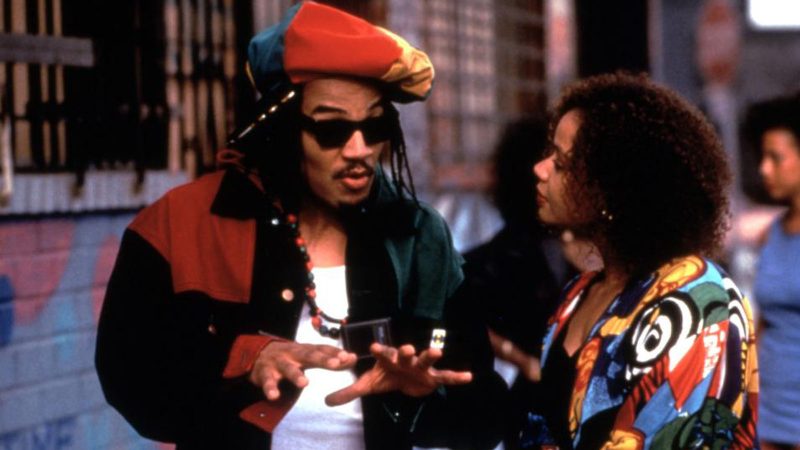
is from Brooklyn, NY. She’s the founder of Alfreda’s Cinema, a long-running immersive Black video-art series and lifestyle that’s currently working toward opening its own space in Brooklyn.
“This phrase ‘point of view’ has to be taken seriously,” said Serge Daney, referencing Fritz Lang’s great and Gothic Moonfleet (1955).
BY FRANK FALISI | January 13, 2025
I say “hello” into a telephone and Chucky says “hi” back. I realize that I perhaps haven’t adequately prepared myself for what this might feel like. He clears his voice and I clear mine. In that stillness, the panic passes.
BY FRANK FALISI | September 3, 2024
Befitting a story of blue-collar desperation, Session 9 is extremely economical in its telling. From the moment the film starts, the personalities of its doomed ensemble...
BY VIOLET LUCCA | October 31, 2021
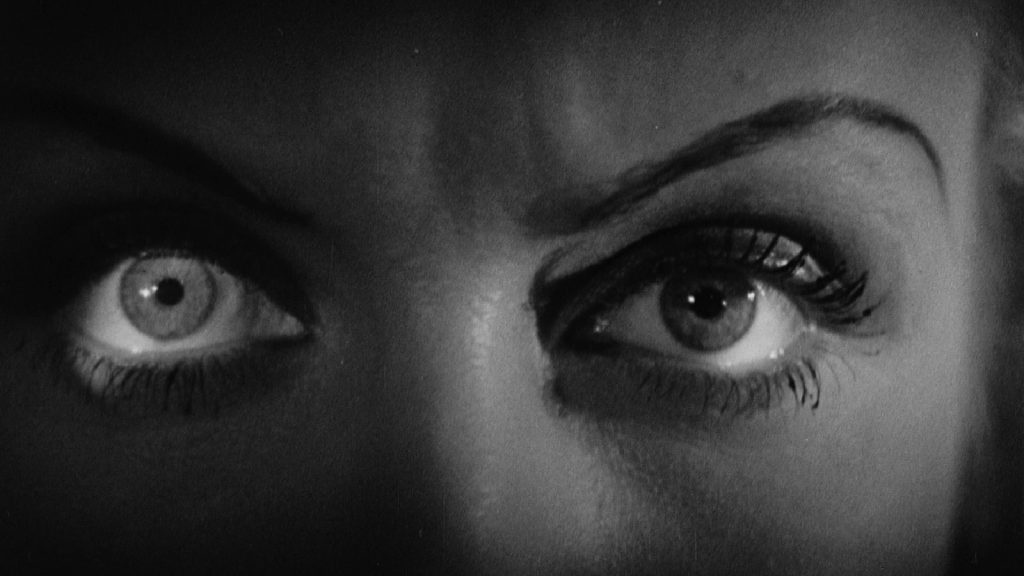
This pre-Code offering packs a lot of story into its typically brisk running time, with several plot threads weaving together a (not always successful) tapestry of spooky and criminal doings.
READ MORE >
BY ANN OLSSON | Month 00, 2021
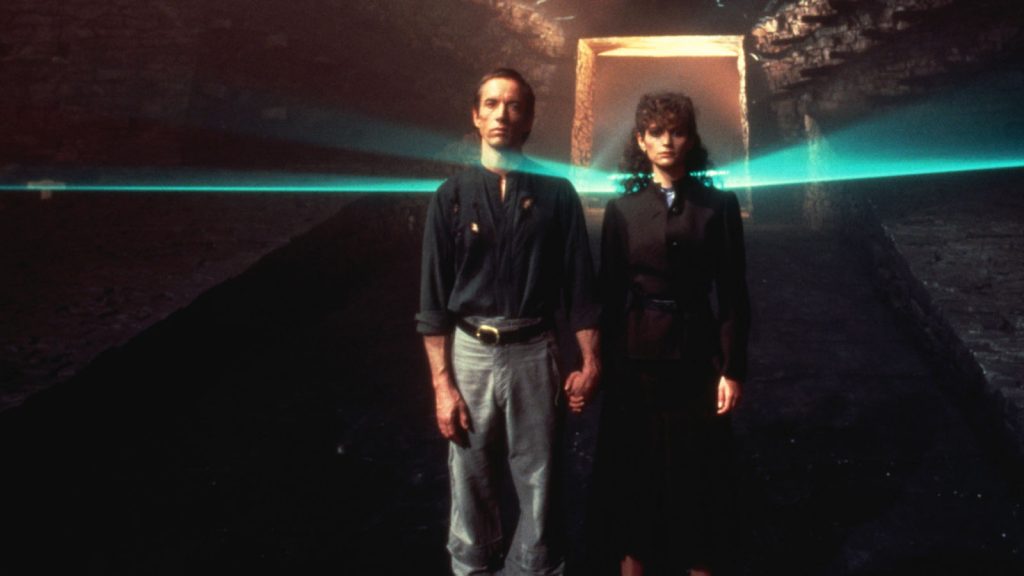
In what could be the fastest-resulting rape revenge movie, a drunken lout brutally forces himself on Ida, the young woman who doesn't return his affections, during a party over Labor Day.
READ MORE >
BY LAURA KERN | Month 00, 2021
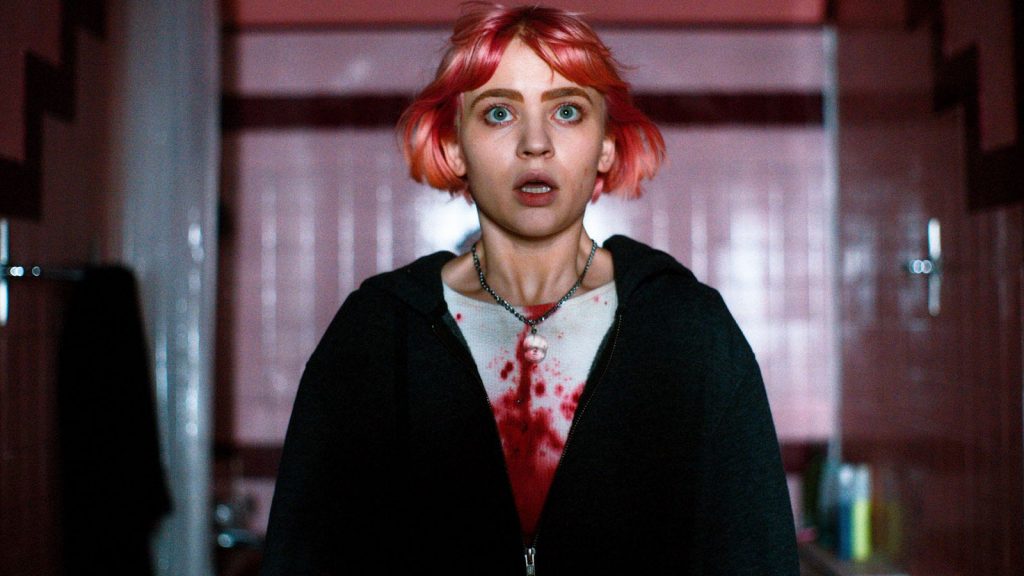
Beast is a lot of movies in one package - fractured fairy tale, belated-coming-of-age story, psychological drama, regional horror film - but above all it's a calling card for its leading lady, Jessie Buckley.
READ MORE >
BY LAURA KERN | Month 00, 2021